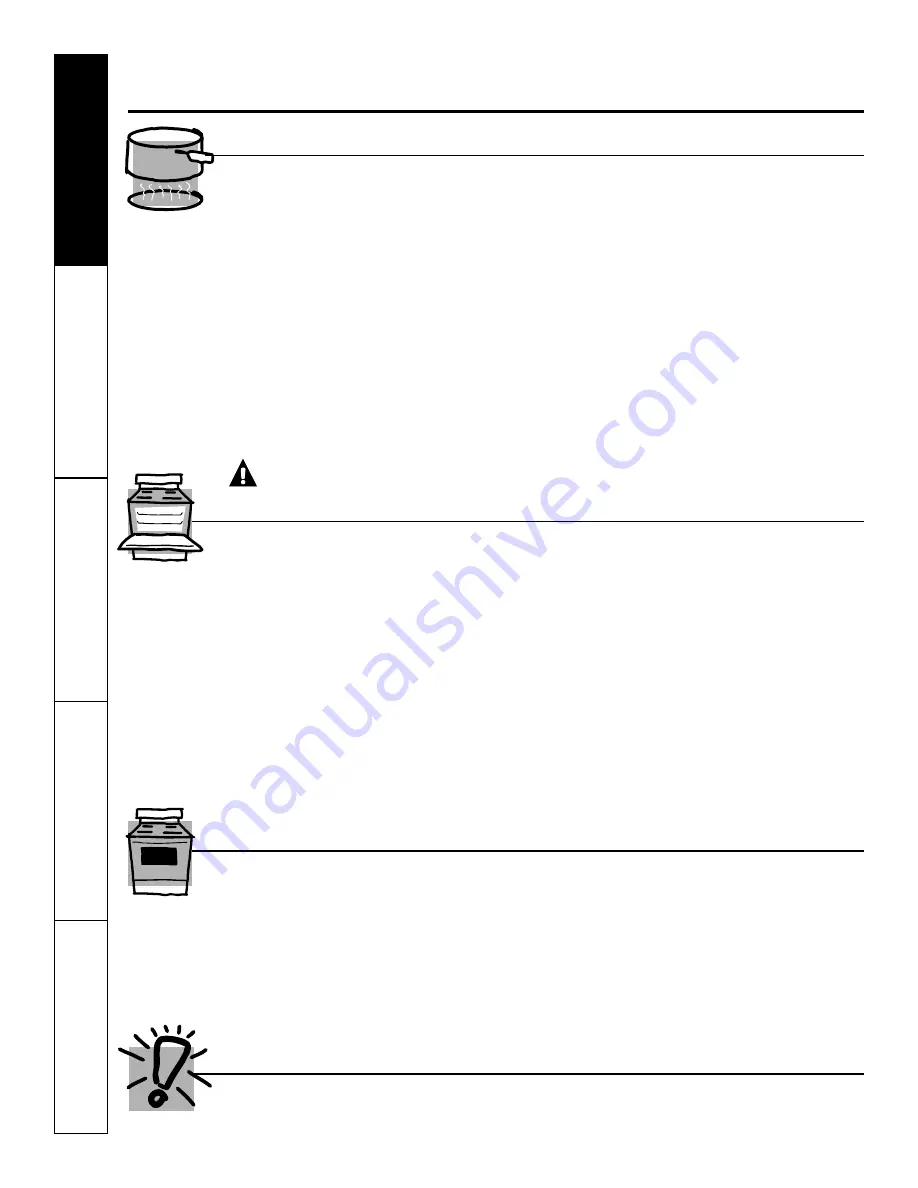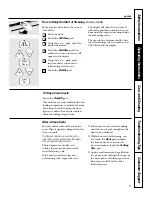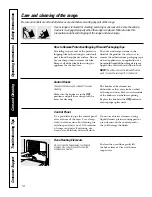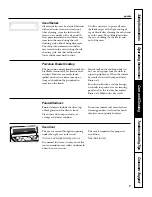
SURFACE COOKING UNITS (cont.)
■
Always turn the surface units off before
removing cookware.
■
Do not immerse or soak the removable surface
units. Do not put them in a dishwasher. Do not
self-clean the surface units in the oven.
■
When preparing flaming foods under the hood,
turn the fan on.
■
To avoid the possibility of a burn or electric
shock, always be certain that the controls for all
surface units are at the
OFF
position and all coils
are cool before attempting to lift or remove
a unit.
■
Clean the cooktop with caution. If a wet sponge
is used to wipe spills on a hot cooktop, be
careful to avoid steam burns.
■
Keep an eye on foods being fried at high or
medium high heat settings.
■
Foods for frying should be as dry as possible.
Frost on frozen foods or moisture on fresh
foods can cause hot fat to bubble up and over
the sides of the pan.
■
Use little fat for effective shallow or deep fat
frying. Filling the pan too full of fat can cause
spillovers when food is added.
■
If a combination of oils or fats will be used in
frying, stir together before heating, or as fats
melt slowly.
■
Always heat fat slowly, and watch as it heats.
■
Use a deep fat thermometer whenever possible
to prevent overheating fat beyond the smoking
point.
4
IMPORTANT SAFETY INFORMATION.
READ ALL INSTRUCTIONS BEFORE USING.
Consumer Support
Tr
oubleshooting T
ips
Care and Cleaning
Operating Instructions
Safety Instructions
READ AND FOLLOW THIS SAFETY INFORMATION CAREFULLY.
SAVE THESE INSTRUCTIONS
■
Do not heat unopened food containers.
Pressure could build up and the container
could burst, causing an injury.
■
Keep the oven vent unobstructed.
■
Keep the oven free from grease buildup.
■
Place the oven shelf in the desired position
while the oven is cool. If shelves must be
handled when hot, do not let pot holder
contact the heating elements.
■
Pulling out the shelf to the stop-lock is a
convenience in lifting heavy foods. It is also a
precaution against burns from touching hot
surfaces of the door or oven walls.
■
When using cooking or roasting bags in the
oven, follow the manufacturer’s directions.
■
Do not use the oven to dry newspapers.
If overheated, they can catch on fire.
■
Do not use the oven for a storage area. Items
stored in an oven can ignite.
■
Do not leave paper products, cooking utensils
or food in the oven when not in use.
■
Do not use aluminum foil to line oven bottoms.
Improper installation of aluminum foil may
result in a risk of electric shock or fire.
Stand away from the range when opening the oven door. Hot air or steam which escapes can cause burns to
hands, face and/or eyes.
WARNING!
OVEN
Do not use oven cleaners. No commercial oven cleaner or oven liner protective coating of any kind should be
used in or around any part of the oven. Residue from oven cleaners will damage the inside of the oven when the
self-cleaning cycle is used
.
■
Do not clean the door gasket. The door gasket
is essential for a good seal. Care should be
taken not to rub, damage or move the gasket.
■
Before self-cleaning the oven, remove shiny,
silver-colored oven shelves (on some models)
and all other cookware.
■
Be sure to wipe up excess spillage before
starting the self-cleaning operation.
■
If the self-cleaning mode malfunctions, turn the
oven off and disconnect the power supply. Have
it serviced by a qualified technician.
■
Clean only parts listed in this Owner’s Manual.
SELF-CLEANING OVEN





































